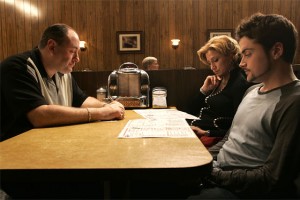SPOILER ALERT: WHY “THE SOPRANOS” SERIES FINALE WAS GENIUS & “DEXTER’S” WASN’T
 Like everyone with a television on June 10, 2007 I had a meltdown just before 10 pm. My TV fritzed out in the closing moments of the most anticipated series finale since the bar at “Cheers” shut its doors almost fifteen years before.
Like everyone with a television on June 10, 2007 I had a meltdown just before 10 pm. My TV fritzed out in the closing moments of the most anticipated series finale since the bar at “Cheers” shut its doors almost fifteen years before.
As Tony Soprano and family sat in Holsten’s diner in Bloomfield, N.J., surely about to put a cap on the years of mind games, mayhem and mafia drama, the screen went dead.
Before I could pick up the phone to complain to the INSERT MAJOR CABLE PROVIDER HERE the music of Journey filled the screen and I realized that the show’s creator had given us an anti ending. Nothing wrapped in a bow.
The series finale of “The Sopranos” made the internet explode. Many people were confused and angry because they wanted tangible closure on the people they had been watching for 86 episodes.
I was upset as well. The ending was audacious, but in moment, not very satisfying. Did Tony and family get whacked, sent back to the primordial ooze, never to be heard from again? Did they enjoy their risotto and go home? Debate ensued, and became quite heated.
I was reminded of the uproar after watching the series finale of “Dexter.”
Seven seasons in, the serial killer with a coconscious show had become stale, but a marvelous turn by Charlotte Rampling as Dexter’s mentor livened things up as the show wound down to its final moments.
Would Dexter find happiness with his serial killer girlfriend? Would Deb survive the bullet that prevented her from arresting murderer Oliver Saxon? Would hurricane Laura throw a wrench into Hannah and Dexter’s escape plan, or would the relentless bounty hunter Jacob Elway find them before the heavy winds blew in?
That’s lots of plot questions to be answered, but more importantly there were larger themes to deal with. Is it possible for a psychopath to ditch his “dark passenger” and embrace life over death?
By and large the show answered these questions, mostly in very predictable ways, and frequently with no regard for reality. SPOILERS! How are we to believe that Dexter could walk undetected through a crowded parking lot with a dead body in tow? How did Dexter survive sailing directly into a hurricane?
It felt safe, and as someone on twitter wrote, “Meh.”
The internet didn’t explode after at 10:01 pm on Sunday. Instead a show that ran for 84 episodes took the easy way out, wrapped up storylines in unbelievable ways and feeling like a letdown.
But it also made me think about the simple beauty of “The Sopranos” finale.
“Dexter’s” sign off reminded me that when you try and please everyone the result is middle of the road pap. In its early years “Dexter” pushed the envelope in terms of violence and dark themes, but the ending was pure Hollywood. No nuance or ambiguity. Just giving the audience what they want.
Except I think we should be more interested in what the filmmakers, writers and actors want. That’s how David Chase ran “The Sopranos.” He respected the audience enough to allow them to bring their own interpretations to the end of the series.
“There’s more than one way of looking at the ending,” he said. “That’s all I’ll say.”
And that’s all that needs to be said.
